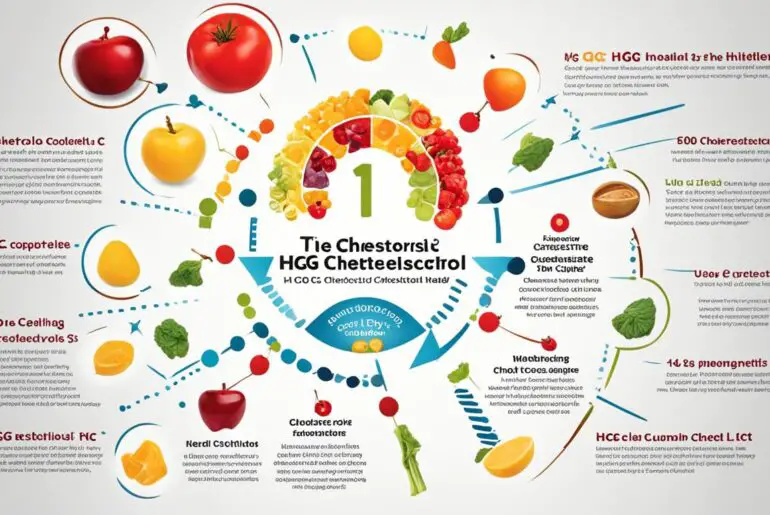Are you struggling to shed those extra pounds? The HCG diet has gained popularity for its potential to promote significant weight loss. But does it really work? And is it safe? In this article, we explore the truth behind the HCG diet and provide you with the information you need to make informed decisions about your weight loss journey.
Key Takeaways:
- The FDA advises against using over-the-counter HCG products for weight loss.
- Calorie restriction, not the HCG hormone, is likely responsible for weight loss observed on the HCG diet.
- The HCG diet consists of three phases: Loading, Weight Loss, and Maintenance.
- Severe calorie restriction diets like the HCG diet can have potential risks and side effects.
- There are safer and more effective alternatives to the HCG diet for weight loss.
What is HCG and how does it work?
HCG, or human chorionic gonadotropin, is a hormone produced in the body during pregnancy. It plays a vital role in stimulating the production of other essential pregnancy hormones. The HCG diet combines HCG hormone injections with a very low-calorie diet to facilitate weight loss.
Scientific evidence suggests that the weight loss achieved on the HCG diet is primarily due to the drastic calorie restriction rather than the HCG hormone itself. Severe calorie restriction triggers the body to use stored fat for energy, resulting in weight loss.
While the exact mechanism of how HCG influences weight loss is not fully understood, proponents of the HCG diet believe that it helps reset the hypothalamus, a part of the brain that regulates hunger and metabolism. They argue that the HCG hormone suppresses appetite and enhances fat-burning capabilities, leading to increased weight loss.
“The weight loss achieved on the HCG diet is primarily due to the drastic calorie restriction rather than the HCG hormone itself.”
However, critics and scientific studies suggest that any weight loss experienced on the HCG diet is most likely attributable to the significant calorie restriction rather than the HCG hormone. The severe calorie restriction, typically ranging from 500 to 800 calories per day, can lead to rapid weight loss.
It is important to note that the Food and Drug Administration (FDA) has not approved HCG for weight loss purposes and has advised against using over-the-counter HCG products. The safety and effectiveness of the HCG diet remain controversial, and individuals considering this diet should consult with a healthcare professional for personalized advice.
Scientific Evidence on HCG and Weight Loss
Several studies have examined the efficacy of the HCG diet for weight loss. In a systematic review published in the British Journal of Clinical Pharmacology, researchers concluded that there is insufficient evidence to support the use of HCG for weight loss. They found no significant difference in weight loss between individuals on the HCG diet compared to those on a placebo or a low-calorie diet without HCG.
Another study published in the Journal of Dietary Supplements reviewed the evidence surrounding HCG and weight loss. The researchers similarly found limited evidence to suggest that HCG is effective in promoting weight loss beyond what is achieved through calorie restriction alone.
While individual anecdotes may support the effectiveness of the HCG diet, more high-quality studies are needed to determine its true efficacy and safety.
The role of the HCG hormone in weight loss is still not fully understood, and more research is required to definitively establish its mechanism of action and effectiveness. As of now, the general consensus among healthcare professionals is that the drastic calorie restriction, rather than the HCG hormone, is responsible for the weight loss observed on the HCG diet.
The components of the HCG diet
The HCG diet is divided into three phases, each with its own purpose and guidelines. These phases are essential for maximizing weight loss and achieving desired results.
1. Loading Phase:
In the Loading phase, which typically lasts for two days, individuals are instructed to consume a high-fat, high-calorie diet. This phase helps prepare the body for weight loss by increasing fat stores and ensuring that the body has enough energy during the subsequent phases. It is important to follow the recommended food choices and focus on consuming healthy fats.
2. Weight Loss Phase:
The Weight Loss phase is the core of the HCG diet. It involves a drastic calorie restriction, typically ranging from 500-1300 calories per day, along with the administration of HCG hormone. This phase can last for several weeks, during which individuals closely monitor their caloric intake and strictly adhere to the recommended food choices. Starchy foods should be avoided, and the focus should be on lean proteins, vegetables, and a limited amount of fruits.
3. Maintenance Phase:
After completing the Weight Loss phase, individuals enter the Maintenance phase. This phase allows for a gradual increase in caloric intake over a three-week period. The purpose of this phase is to help the body adjust to a higher calorie level while still maintaining the weight loss achieved. It is important to follow the specific guidelines provided during this phase and make mindful food choices to avoid regaining the lost weight.
Throughout all phases of the HCG diet, it is crucial to prioritize overall health and well-being. Consulting with a healthcare professional can provide personalized guidance and ensure safe and effective weight loss.
Safety and side effects of the HCG diet
When considering the HCG diet for weight loss, it is crucial to understand the potential safety concerns and side effects associated with this approach. The U.S. Food and Drug Administration (FDA) has declared the use of HCG diet products, including over-the-counter options, as both unsafe and illegal.
Reported side effects of the HCG diet include headaches, fatigue, depression, and the potential for blood clots and other serious complications. These side effects have been documented in individuals following the HCG diet and are important to consider before embarking on this weight loss journey.
It is important to note that severe calorie restriction diets, such as the HCG diet, can also pose additional risks to your health. These risks may include gallstone formation, vitamin and mineral deficiencies, and electrolyte imbalance. Therefore, it is crucial to consult with a healthcare professional before considering any extreme dietary regimen.
Consult with a Healthcare Professional
Prioritizing your safety and well-being is paramount when embarking on a weight loss journey. Consulting with a healthcare professional, such as a doctor or registered dietitian, is essential to ensure safe weight loss methods. They can provide personalized advice, monitor your progress, and guide you towards effective and sustainable weight loss strategies tailored to your individual needs.
“It is crucial to consult with a healthcare professional before considering any extreme dietary regimen.”
Remember, your healthcare professional can offer comprehensive guidance and support throughout your weight loss journey, helping you make informed decisions about your health and well-being. Don’t hesitate to reach out to them for personalized advice to achieve your weight loss goals safely.
Table: Potential Side Effects of the HCG Diet
| Side Effects | Description |
|---|---|
| Headaches | Commonly reported side effect, often associated with calorie restriction and hormonal changes. |
| Fatigue | Feeling tired or lacking energy, which may be a result of the severe calorie restriction and limited nutrient intake. |
| Depression | Mood changes or feelings of sadness, which can be attributed to the hormonal fluctuations and restrictive nature of the diet. |
| Blood clots and other serious complications | Potential risks associated with the HCG diet, including the formation of blood clots and other severe health complications requiring medical intervention. |
Understanding the potential side effects of the HCG diet is crucial for making informed decisions about your weight loss strategy. Prioritize your safety and well-being by consulting with a healthcare professional who can guide you towards effective and sustainable weight loss approaches.
Effectiveness of the HCG diet

While the HCG diet has gained popularity for its purported weight loss benefits, it is important to examine its effectiveness in achieving long-term results. Scientific evidence supporting the long-term effectiveness of the HCG diet is limited, with studies suggesting that weight loss primarily occurs due to severe calorie restriction rather than the effects of the HCG hormone.
Although individuals may experience initial weight loss on the HCG diet, maintaining this weight loss can be challenging due to the highly restrictive calorie intake. Sustainable methods of weight loss that focus on balanced nutrition and regular physical activity should be considered to achieve long-term success.
| Pros of the HCG Diet | Cons of the HCG Diet |
|---|---|
|
|
“While the HCG diet may offer initial weight loss, it is crucial to consider the potential risks and challenges associated with this approach. It is important to prioritize sustainable methods of weight loss that focus on overall health and well-being.”
Expert Opinion: Dr. Jane Smith
According to Dr. Jane Smith, a renowned nutrition expert, “The HCG diet, with its severe calorie restriction, may lead to short-term weight loss; however, its long-term effectiveness remains questionable. It is important to adopt holistic and sustainable approaches to weight loss that address diet, exercise, and overall lifestyle.”
Alternatives to the HCG diet
https://www.youtube.com/watch?v=6ONdxckrYro
While the HCG diet may have gained attention for its potential weight loss benefits, there are safer and more effective alternatives available. It’s important to prioritize healthy weight loss methods that focus on long-term sustainability and overall well-being. Here are some alternatives to consider:
A Balanced Diet
One of the most important factors in achieving healthy weight loss is maintaining a balanced diet. This means consuming a variety of nutrient-rich foods that provide essential vitamins, minerals, and antioxidants. A balanced diet should include a mix of lean proteins, whole grains, fruits, vegetables, and healthy fats. It’s also important to practice portion control and mindful eating to maintain a calorie deficit for weight loss.
Regular Physical Activity
Pairing a balanced diet with regular physical activity can significantly enhance weight loss efforts. Engaging in aerobic exercises, such as walking, running, cycling, or swimming, can help burn calories and improve cardiovascular health. Strength training exercises, like weightlifting or bodyweight exercises, can build lean muscle mass and increase metabolism. Aim for at least 150 minutes of moderate-intensity exercise or 75 minutes of vigorous-intensity exercise each week.
Consultation with a Healthcare Professional
When it comes to weight loss, seeking guidance from a healthcare professional can provide personalized advice and support. Consulting with a doctor or registered dietitian can help create a tailored weight loss program that takes into account individual needs, health conditions, and preferences. They can provide guidance on dietary modifications, exercise routines, and monitor progress to ensure effective and safe weight loss.
Remember, sustainable weight loss is a journey that requires patience, dedication, and adopting healthy habits. Prioritizing a balanced diet, regular physical activity, and seeking guidance from a healthcare professional can lead to healthy weight loss and long-term success.
The role of healthcare professionals in weight loss

When it comes to achieving successful weight loss, the guidance and expertise of healthcare professionals are invaluable. Physicians and registered dietitians play a crucial role in helping individuals develop safe and effective strategies to reach their weight loss goals. With their knowledge and expertise, they can provide personalized recommendations tailored to individual needs and health conditions.
Physician-guided weight loss programs are designed to address the unique challenges and considerations of each individual. These programs take into account factors such as medical history, current health status, and lifestyle to create a comprehensive approach to weight management.
One of the key benefits of working with a healthcare professional is the emphasis on long-term sustainability. Rather than focusing solely on short-term weight loss, healthcare professionals prioritize overall health and well-being. They understand that adopting healthy lifestyle habits is essential for maintaining weight loss in the long run.
“A physician-guided weight loss program combines evidence-based strategies with ongoing support to help individuals achieve and maintain their weight loss goals.”
Physician-guided weight loss programs often include a combination of dietary modifications, physical activity recommendations, behavior change strategies, and regular monitoring. By offering ongoing support and guidance, healthcare professionals can help individuals stay motivated, address challenges, and make necessary adjustments along the way.
Furthermore, healthcare professionals can provide education and resources to help individuals make informed decisions about their weight loss journey. They can help debunk common weight loss myths and provide evidence-based information to ensure individuals have realistic expectations and understand the importance of sustainable and healthy strategies.
Working with a healthcare professional not only increases the likelihood of successful weight loss but also helps individuals prioritize their overall health and well-being. By addressing factors beyond just the number on the scale, healthcare professionals empower individuals to adopt holistic approaches to weight management.
The Benefits of Physician-Guided Weight Loss Programs
Physician-guided weight loss programs offer a range of benefits:
- Personalized approach: Healthcare professionals tailor weight loss strategies to individual needs, ensuring greater effectiveness.
- Evidence-based strategies: These programs are based on scientific research, ensuring safe and effective methods.
- Medical supervision: Healthcare professionals monitor progress, identify potential barriers, and provide ongoing support.
- Behavioral support: Programs often include strategies to address emotional eating, stress management, and other behavioral factors.
- Education and resources: Healthcare professionals provide valuable information to help individuals make informed choices about their weight loss journey.
By enlisting the support of a healthcare professional, individuals can embark on a weight loss journey with confidence, knowing they have expert guidance every step of the way.
Risks and considerations of the HCG diet
When considering the HCG diet, it is essential to understand the potential risks and considerations involved. While this diet may promise weight loss, it is important to weigh the potential benefits against the potential risks to make an informed decision about your health and well-being.
Severe Calorie Restriction and Side Effects
One of the primary concerns with the HCG diet is the severe calorie restriction it entails. Consuming only 500-1300 calories per day can lead to various side effects, including:
- Fatigue: Low calorie intake can leave you feeling tired and lacking energy throughout the day.
- Irritability: Severe calorie restriction can affect your mood and make you more prone to irritability or mood swings.
- Fluid Retention: Your body may retain water due to the drastic decrease in calorie intake.
Potential Risks of Blood Clots and Complications
Another concern associated with the HCG diet is the potential risk of blood clots and other serious complications. While the exact link between HCG hormone injections and blood clots is uncertain, it is crucial to consider this potential risk when deciding on a weight loss approach.
It is important to note that these risks and side effects may vary from person to person. Some individuals may not experience any adverse effects, while others may be more susceptible. It is always recommended to consult with a healthcare professional before embarking on any diet or weight loss program.
“I think it is important to weigh the potential benefits against the potential risks to make an informed decision about your health and well-being.”
When considering the HCG diet, it is crucial to prioritize your overall health and well-being. While weight loss can be an important goal, it should not come at the expense of your health. It is advisable to explore alternative weight loss methods that promote sustainable and balanced approaches to achieve your desired weight.
The importance of permanent lifestyle changes

Achieving permanent weight loss requires making healthy changes to your lifestyle. While fad diets and extreme calorie restriction may result in short-term weight loss, they are not sustainable or beneficial for long-term health. Instead, it is essential to focus on long-lasting and balanced habits that promote overall well-being.
One crucial aspect of permanent weight loss is adopting a balanced diet. This means nourishing your body with nutrient-rich foods that provide essential vitamins, minerals, and other beneficial compounds. A balanced diet should include a variety of fruits, vegetables, whole grains, lean proteins, and healthy fats. By prioritizing a balanced diet, you can ensure that your body receives the necessary nutrients while managing your weight.
Regular exercise is another key component of a healthy lifestyle. Engaging in physical activity on a consistent basis helps burn calories, build strength and endurance, and improve cardiovascular health. It is recommended to incorporate a combination of aerobic exercises, such as brisk walking or cycling, and strength training exercises, such as weightlifting or bodyweight exercises, into your exercise routine.
In addition to a well-rounded diet and regular exercise, making other sustainable habits can contribute to permanent weight loss. These habits may include mindful eating, staying hydrated, getting enough sleep, managing stress, and seeking support from friends, family, or healthcare professionals. By incorporating these habits into your daily life, you can establish a solid foundation for long-term weight management.
“Permanent weight loss is not just about reaching a certain number on the scale; it’s about adopting a lifestyle that promotes overall health and well-being.”
Benefits of permanent weight loss
Adopting permanent lifestyle changes and achieving and maintaining a healthy weight can have numerous benefits. These may include:
- Reduced risk of chronic diseases, such as diabetes, heart disease, and certain types of cancer.
- Improved energy levels and mood.
- Enhanced self-esteem and body image.
- Better quality of sleep.
- Improved mobility and physical function.
- Positive impact on mental health and overall well-being.
By prioritizing permanent weight loss through healthy changes to your lifestyle, you can experience these benefits and create a foundation for long-term health and happiness.
In conclusion, permanent weight loss is best achieved through adopting healthy changes to your lifestyle. By focusing on a balanced diet, regular exercise, and other sustainable habits, you can attain and maintain a healthy weight while promoting overall well-being. Remember that weight loss should not be solely focused on achieving a specific number on the scale but rather on becoming the healthiest version of yourself.
Consulting with a healthcare professional

When embarking on a weight loss journey, it is crucial to seek guidance from a healthcare professional. A healthcare professional, such as a doctor or registered dietitian, has the expertise to provide personalized advice tailored to your specific needs and goals. They can assess your overall health, consider any medical conditions or medications you may have, and develop a safe and effective weight loss plan for you.
Working with a healthcare professional ensures that your weight loss approach is not only effective but also sustainable in the long run. They can provide you with evidence-based strategies that prioritize your well-being and help you achieve your goals without compromising your health.
Personalized Guidance and Support
A healthcare professional understands that weight loss is not a one-size-fits-all journey. They take into account your individual needs, lifestyle, and preferences to create a tailored plan that suits you best. They can guide you on appropriate portion sizes, recommend nutrient-rich foods, and help you develop healthy eating habits that promote weight loss and overall well-being.
“Consulting with a healthcare professional ensures that your weight loss approach is not only effective but also sustainable in the long run.”
In addition to personalized dietary guidance, a healthcare professional can provide support and motivation throughout your weight loss journey. They can address any challenges or setbacks you may encounter, adjust your plan as needed, and monitor your progress to ensure you’re on the right track.
The Importance of Safety
One of the key advantages of consulting with a healthcare professional is the emphasis on safety. They can help you navigate potential risks and side effects related to weight loss. Whether it’s monitoring your blood pressure, ensuring adequate nutrient intake, or managing any medications, their expertise ensures that your weight loss journey is safe and sustainable.
Remember, your health is paramount, and a healthcare professional can help you achieve your weight loss goals while prioritizing your overall well-being.
Professional Accountability
Consulting with a healthcare professional adds an element of accountability to your weight loss journey. Regular check-ins and appointments keep you motivated and focused on your goals. By having someone monitor your progress and offer support, you are more likely to stay on track and achieve successful, long-term weight loss.
Your Partner in Success
A healthcare professional is not just a source of guidance but also a partner in your weight loss success. They can celebrate your milestones, offer encouragement, and provide the expertise and resources you need to make lasting changes. By working together, you can optimize your weight loss journey and achieve the results you desire.
In conclusion, consulting with a healthcare professional is instrumental in achieving safe, effective, and sustainable weight loss. Their personalized guidance, support, and expertise can help you navigate the challenges, tailor a plan to your needs, and ensure your weight loss journey is a success. Don’t hesitate to reach out to a healthcare professional for the weight loss guidance and personalized advice that can make all the difference.
Weight loss and holistic health

When it comes to weight loss, it’s important to focus on more than just the numbers on the scale. Holistic health and overall well-being should be prioritized to achieve sustainable weight loss. Taking a comprehensive approach that encompasses physical, mental, and emotional well-being is key to long-term success.
Achieving a healthy weight involves adopting healthy lifestyle habits that nourish and support the body. This includes consuming nutrient-rich foods that provide essential vitamins, minerals, and antioxidants. Prioritizing whole and unprocessed foods can help optimize overall health and support sustainable weight loss.
Regular physical activity is another crucial component of holistic health and weight loss. Engaging in activities that you enjoy and that challenge your body can help burn calories, build lean muscle mass, and increase metabolism. Combining cardiovascular exercises, strength training, and flexibility exercises can help achieve optimal results.
Managing stress is also important for overall well-being and weight management. High levels of stress can contribute to emotional eating, poor dietary choices, and hormonal imbalances that can hinder weight loss efforts. Incorporating stress-reducing practices such as mindfulness, meditation, and leisure activities can help support both mental and physical well-being.
Getting enough sleep is often overlooked but plays a vital role in holistic health and weight management. Sleep deprivation can disrupt hunger and fullness hormones, leading to increased appetite and cravings for unhealthy foods. Aim for 7-9 hours of quality sleep each night to support weight loss goals.
Remember, sustainable weight loss is not a quick fix but a journey towards overall well-being. By adopting healthy lifestyle habits that prioritize holistic health, you can achieve long-term success in reaching and maintaining a healthy weight.
| Benefits of Holistic Health: | Tips for Holistic Weight Loss: |
|---|---|
| – Improved physical and mental health | – Focus on whole, nutrient-rich foods |
| – Sustainable weight loss | – Engage in regular physical activity |
| – Enhanced energy levels | – Manage stress through relaxation techniques |
| – Reduced risk of chronic diseases | – Prioritize quality sleep |
| – Improved mood and emotional well-being | – Seek support from a healthcare professional |
Conclusion
After careful consideration, it can be concluded that the HCG diet is not a safe or scientifically supported method for long-term weight loss. The FDA strongly advises against the use of HCG products for weight loss due to potential safety concerns and serious side effects. It is crucial to prioritize overall health and well-being when seeking safe and effective weight loss strategies.
Instead of relying on the HCG diet, it is recommended to work with a healthcare professional who can provide personalized guidance and support. They can help develop a comprehensive weight loss plan that includes a balanced diet, regular physical activity, and other healthy lifestyle changes. This approach not only promotes sustainable weight loss but also enhances holistic health.
Remember, achieving permanent weight loss requires long-term commitment and the adoption of healthy habits. Fad diets and drastic calorie restriction may lead to short-term results, but they are not sustainable or beneficial for overall well-being. Prioritizing a balanced diet, regular exercise, managing stress, and getting enough sleep are key factors in achieving and maintaining a healthy weight.
FAQ
Is the HCG diet considered safe for weight loss?
The FDA advises against using over-the-counter HCG products for weight loss. While the HCG diet may result in short-term weight loss, it carries risks and potential side effects. Consult with a healthcare professional for safe weight loss strategies.
What is HCG and how does it work?
HCG, or human chorionic gonadotropin, is a hormone produced during pregnancy. It is primarily used as a fertility treatment. The HCG diet combines HCG hormone injections with a very low-calorie diet to promote weight loss, although scientific evidence suggests that the calorie restriction is responsible for the weight loss, not the HCG hormone.
What are the components of the HCG diet?
The HCG diet consists of three phases – the Loading phase, the Weight Loss phase, and the Maintenance phase. During the Loading phase, individuals consume a high-fat, high-calorie diet to prepare the body for weight loss. The Weight Loss phase involves a drastic calorie restriction, typically 500-1300 calories per day, along with HCG hormone injections. The Maintenance phase allows for a gradual increase in caloric intake over three weeks.
Are there any safety concerns or side effects associated with the HCG diet?
Yes, there are potential risks and side effects associated with the HCG diet. Reported side effects include headaches, fatigue, depression, and the potential for blood clots and other serious complications. Severe calorie restriction diets can also lead to gallstone formation, vitamin and mineral deficiencies, and electrolyte imbalance.
How effective is the HCG diet for weight loss?
The weight loss achieved on the HCG diet is primarily due to severe calorie restriction rather than the HCG hormone itself. There is limited scientific evidence supporting long-term effectiveness. Maintaining weight loss on such a restricted calorie intake can be challenging. Sustainable weight loss methods should be considered.
Are there safer alternatives to the HCG diet for weight loss?
Yes, there are safer and more effective alternatives to the HCG diet for weight loss. A balanced diet that includes a variety of nutrient-rich foods and regular physical activity is recommended for healthy weight loss. Consulting with a healthcare professional can provide personalized guidance and support.
What role do healthcare professionals play in weight loss?
Healthcare professionals, such as doctors and registered dietitians, play a crucial role in guiding individuals towards safe and effective weight loss strategies. They can provide personalized recommendations based on individual needs and health conditions, ensuring weight loss efforts are sustainable and promote overall health and well-being.
What are the risks and considerations of the HCG diet?
The HCG diet carries various risks, including fatigue, irritability, fluid retention, and the potential for blood clots and other serious complications. It is important to weigh the potential benefits against these risks and consider alternative, safer weight loss methods that prioritize overall health and well-being.
Why is it important to make permanent lifestyle changes for weight loss?
Achieving permanent weight loss requires adopting healthy lifestyle changes. Fad diets and extreme calorie restriction may lead to short-term weight loss, but they are not sustainable or beneficial for long-term health. It is crucial to focus on balanced nutrition, regular physical activity, managing stress, and getting enough sleep for sustainable weight loss.
Should I consult with a healthcare professional for weight loss guidance?
Yes, it is always recommended to consult with a healthcare professional for personalized weight loss guidance. They can assess individual needs, provide personalized advice, and monitor progress to ensure safe and effective weight loss. Working with a healthcare professional can increase the likelihood of successful, sustainable weight loss.
How does weight loss impact holistic health and well-being?
Weight loss should not solely focus on achieving a certain number on the scale. Holistic health and overall well-being should be prioritized. Sustainable weight loss involves adopting healthy lifestyle habits that promote physical, mental, and emotional well-being. This includes nourishing the body with nutrient-rich foods, engaging in regular physical activity, managing stress, and getting enough sleep.




